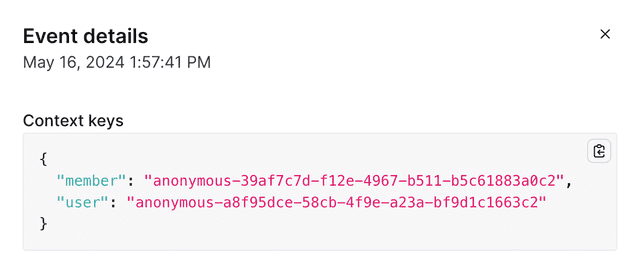Metric events
Read time: 3 minutes
Last edited: Jan 22, 2025
Overview
This topic explains the different metric event types and which SDKs they are compatible with.
An "event" happens when an end user takes an action in your app, such as clicking on a button, or when a system takes an action, such as loading a page. Your SDKs send these events to LaunchDarkly, where LaunchDarkly metrics can aggregate and analyze them. LaunchDarkly can then quantify the overall performance and health of your product and provide suggestions on how to respond.
Types of metric events
There are three types of metric events:
customevents are produced by custom conversion binary, custom conversion count, and custom numeric metrics. You can sendcustomevents using the track feature in your SDK.- Conversion metrics register events when an end user takes an action based on a feature flag they encounter.
- Numeric metrics measure numeric values against a baseline you set.
clickevents are produced by clicked or tapped metrics.page viewevents are produced by page viewed metrics.
To learn more about event kinds, read Event kinds. To learn more about Experimentation events, read Experimentation and metric events.
Try it in your SDK: Sending custom events
SDK compatibility
The following table explains the kinds of events you can track with a metric and their SDK compatibility:
| Event kind | Metric | Description | SDK compatibility |
|---|---|---|---|
| Custom | Conversion binary | Tracks events for any arbitrary event. | All |
| Custom | Conversion count | Counts events for any arbitrary event. | All |
| Custom | Numeric | Tracks increases or decreases in numeric value against a baseline you set. | All |
| Clicked or tapped | Conversion | Tracks the clicks on a user interface (UI) element. | Electron JavaScript Node.js (client-side) React Web Vue |
| Page viewed | Conversion | Tracks how many times a page is viewed. | Electron JavaScript Node.js (client-side) React Web Vue |
To learn more about different metric types and when to use them, read Choose a metric type.
For examples of common metrics and how to configure them, read Example metrics.
Metric event activity
The metric event activity tab provides visibility into the events LaunchDarkly is receiving for a given metric.
The activity tab includes information for the most recently received event, and for the last 100 events received within two hours of that event.
For each event, the activity tab displays:
- Timestamp: when the metric received the event.
- Context key: the key of the context that generated the event.
- Value: for custom numeric metrics, the numeric value of the event.
To view more information about a specific event, click on the event row. An "Event details" dialog appears:

To learn how to view a list of all of the metric events your SDKs are sending to LaunchDarkly, read Viewing incoming events.
Event keys
Sending custom events to LaunchDarkly requires a unique event key. You can set the event key to anything you want. Adding this event key to your codebase lets your SDK track actions customers take in your app as events. To learn more, read Sending custom events.
LaunchDarkly also automatically generates a metric key when you create a metric. You only use the metric key to identify the metric in API calls. To learn more, read Creating and managing metrics.
LaunchDarkly SDKs track actions customers take in your app as events and sends them to LaunchDarkly. Events are specific to one LaunchDarkly environment.
An event key is a unique identifier you set for a particular kind of event within your app. You can set an event key to anything you want. When you are using metrics, the event key in your metric and the event key in your code must match exactly. To learn more, read Sending custom events.